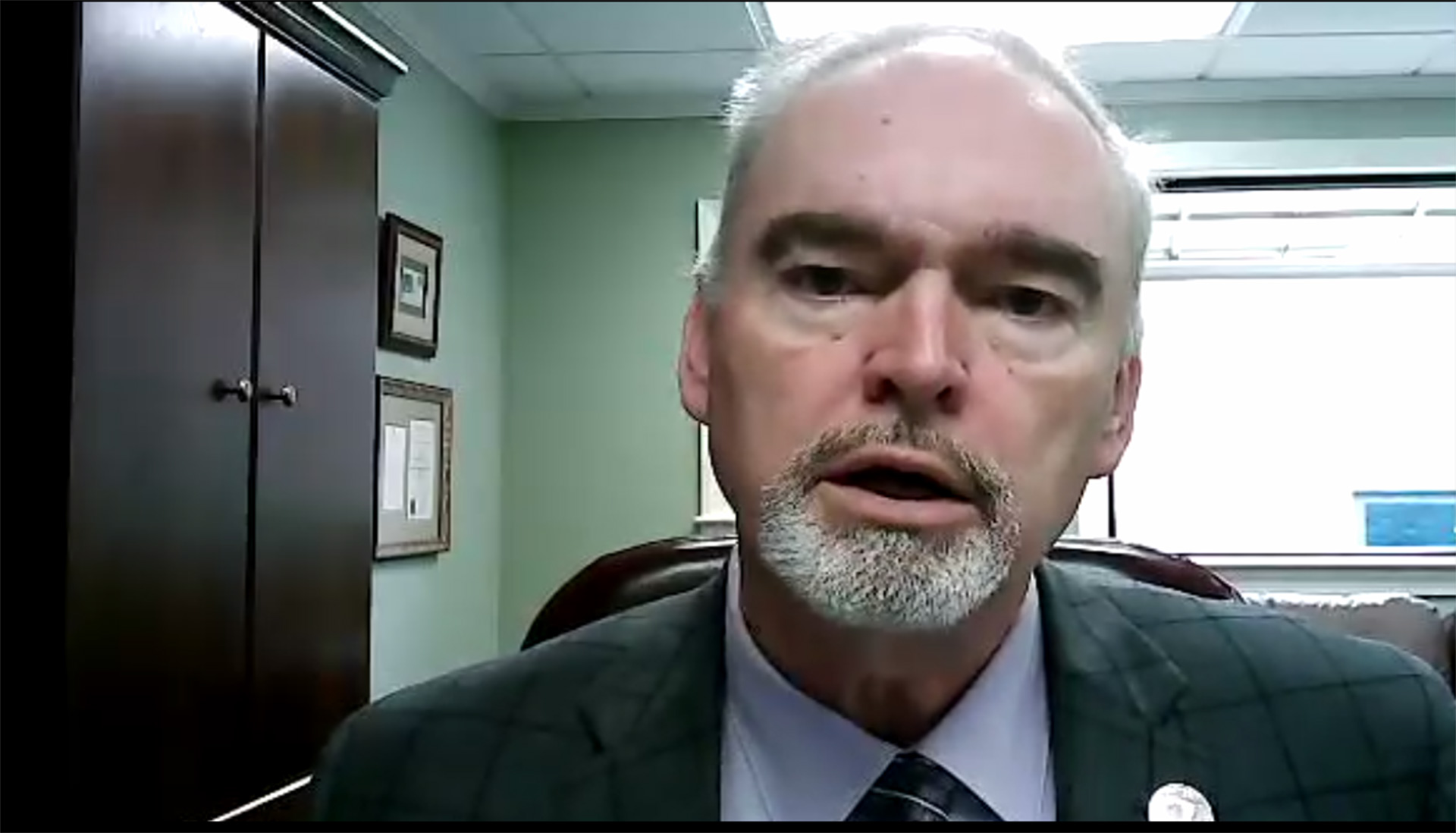RCC opens 58th year
President Shackleford presents initiatives online for annual fall convocation
ASHEBORO — With faculty, staff, and board members tuned in on Zoom, Randolph Community College President Dr. Robert S. Shackleford Jr. opened the College’s fall convocation Friday, Aug. 14. The College began its 58th year when classes started Monday, Aug. 17, with an alternative course delivery, where possible and practical, to maximize student progress while minimizing risks and the spread of COVID-19.RCC Board President Mac Sherrill welcomed those in attendance.
“I want to thank each of you for all you do for our students,” he said. “Your caring teamwork makes RCC a great place to work. Our Trustees thank you for the extra work you’ll be doing during these difficult virus days. Let me give my best wishes for a great year.”
After the vice presidents introduced new faculty and staff, Shackleford then presented his initiatives for the year. The initiatives, which began when Shackleford became president of the College in January 2007, fall into five areas identified as the core values of the College: Community, Employees, Quality Education, Radical Hospitality, and Student Success.
“In thinking about these presidential initiatives this year, it really was weighing heavy on my mind that these are not ordinary times,” he said. “The initiatives don’t need to just be business as usual. They need to address the times in which we’re living. They are designed to help move the College forward in a significant way this coming year.”
Under Community, the initiative is to be a front-and-center change agent to help Randolph County rebound from the economic and workforce devastation caused by the coronavirus pandemic. RCC will do this by:
- Employing its Small Business Center’s resources to aid small businesses in their recovery efforts,
- Update RCC’s website to better keep the community and prospective students apprised of the opportunities available at RCC for educational and career development,
- Utilize community input to identify new emerging training/educational needs in response to COVID-19.
Under Employees, RCC plans to find and utilize the right balance of on-site and telecommuting faculty and staff responsibilities as it slowly emerges from the coronavirus pandemic, exercising the appropriate flexibility without compromising the mission and operations of the College. RCC will implement this by:
- Surveying faculty and staff to identify any obstacles to productivity that RCC can improve,
- Collect, analyze, and evaluate data to determine best practices for delivering instruction and support services (e.g., virtual, face-to-face, blended) to students,
- Institute a telecommuting policy with clear guidelines for work schedules that are clear, equitable, and appropriate.
Under Quality Education, the College plans to take online instruction from good to great, employing the best technology, the latest innovations, and ongoing professional development by:
- Creating professional development opportunities for faculty and staff to address gaps with online instruction and delivery of services,
- Exploring, identifying, and implementing ways to enhance innovative, technology-enabled, student-centric approaches to online instruction,
- Using CARES Grant funding to pay for specialized virtual training to help faculty learn new skills in educational delivery methods.
Under Radical Hospitality, RCC will take specific actions to create a campus environment even more characterized by diversity, equity, and inclusion by:
- Developing a cultural diversity lecture series for the college and community,
- Reinvigorate the Minority Male Mentoring Program,
- Offering more professional development opportunities for faculty and staff specifically related to diversity, equality, and inclusion,
- Revising the BLET (Basic Law Enforcement Training) curriculum to include more, updated diversity and de-escalation training for local law enforcement,
- Developing strategies to evaluate the content of courses to ensure diversity and inclusion within the material and resources utilized for instruction, making changes accordingly.
“I hope that RCC will be one place that anyone, whoever they are or whatever their background, that they will feel included here, and we’re going to take them where they are and try to help them have a great opportunity to move forward.”
Under Student Success, the College will support its students’ academic success and assist with personal obstacles that hinder their success by utilizing proactive intercession, including both on-site and online student support services by:
- Integrating Aviso software and the lessons learned from our experience in the FITW (First In The World) grant to better enable tracking at-risk students and interceding on their behalf,
- Instituting the coaching model across all instructional divisions, including both credit and noncredit, to provide personalized guidance and coaching for students,
- Implementing a Student Assistance Program (SAP), similar to our Employee Assistance Program (EAP), as an extension of the student services it provides on campus,
- Creating a holistic support network that combines technology and programming with community services to connect students with comprehensive resources that help to alleviate barriers to success.
Shackleford closed the convocation with a quote from John F. Kennedy, “One person can make a difference, and everyone should try,” and with both personal anecdotes and those involving RCC faculty and staff that gave “the gift of their hearts” to make a difference in someone’s life.
“RCC is not a typical college,” Shackleford said. “We’re not job-focused. We’re mission-focused. Each of you are going to have an opportunity this year to make a difference.
“We have a lot of students who are coming this fall who are being swept downstream by these wild, rapid currents. One person can throw out a lifeline and help change the trajectory of that student’s life. You can be that one person.”

